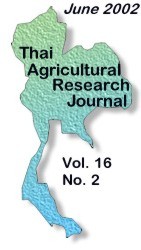ThaiScience
ThaiScience
THAI AGRICULTURAL RESEARCH JOURNAL
Volume 38, No. 03, Month SEPTEMBER, Year 2020, Pages -
Diurnal leaf net co 2 assimilation, acid content and photochemistry of pineapple (ananas comosus l. merr.) ‘smooth cayenne’
Pannee Chuennakorn, Suntaree Yingjajaval
Abstract Download PDF
Pineapple as a crassulacean acid metabolism (CAM)plant was reported to display full 4 carboxylation phases. To elucidate this process, we carried out 24 h monitoring of photosynthesis of pineapple ‘Smooth Cayenne’ in open field in all 3 seasons in Prachuap Khiri Khan Province. We measured leaf gas exchange, total acid content (H+), and photochemistry of PSII (chlorophyll fluorescence). The gas exchange data obtained, confirmed the presence of the 4 carboxylation phases. Phase I occurred during dark period, net CO2 assimilation rate (A) increased in consistent with increase of stomatal conductance (gs), having the maximal A in the low range of 2–2.6 μmolCO2 m–2 s –1, accompanied by the increase in H+ . The increment in A and H+ continued into Phase II during early morning which lasted about 2 h when radiation (PPF) was still low. In Phase II, photochemistry commenced showing an increase in electron transport rate (ETR), whereas H+ reached its maximum. Subsequent stronger PPF initiated Phase III, when A turned negative as the reducing gs limiting external CO2 intake. On the other hand, ETR continued to increase to its maximum, enabling the decarboxylation of the accumulated acid. The average acid decarboxylation rate (ADR), from the CO2 carboxylation process was 6.7–7.8 µmolCO2 m–2 s –1. Phase III which lasted 6-8 h ended in late afternoon, as H+ was mostly spent and ADR dropped closed to zero. In pineapple, Phase IV clearly appeared when gs increased (stomata reopening) and positive A was detected.
Keywords
net CO2 assimilation, stomatal conductance, photochemistry, acid decarboxylation rateTHAI AGRICULTURAL RESEARCH JOURNAL
Published by : Department of Agriculture
Contributions welcome at : http://it.doa.go.th/
